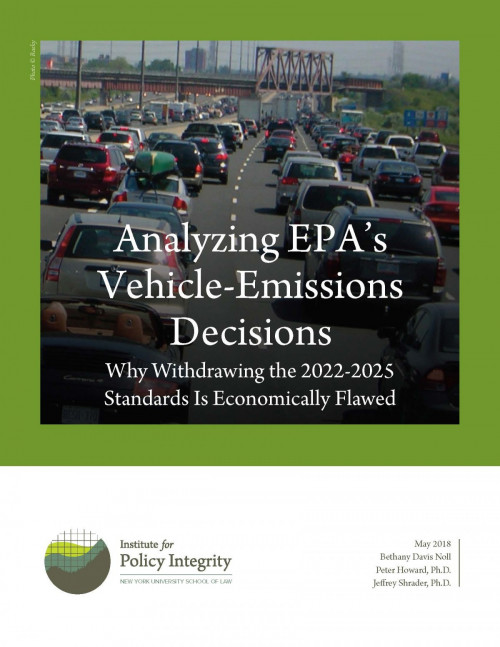-
Comments to Interior on San Juan Mine Lease Extension DEIS (New Mexico)
The Department of the Interior is proposing to extend leasing and operations at New Mexico’s San Juan mine by 15 years, producing up to 53 million additional tons of coal that will release 97.5 million tons of greenhouse gas emissions when combusted. In our comments to Interior on its draft environmental impact statement (DEIS) for the mine’s lease extension, we criticize Interior’s failure to fully account for the climate effects related to the project by monetizing the damage these emissions will cause. This refusal leaves the public and decisionmakers in the dark about the climate effects of the project, and is arbitrary given that the agency relies on the project’s monetized benefits to justify its action.
-
Brief to SCOTUS on Economic Impact of Conservation Designations
We recently filed, in a case before the Supreme Court, a brief on the role of ancillary and unquantified benefits in cost-benefit analysis for environmental policy. The Fish and Wildlife Service, in declaring critical habitat designation areas for the dusky gopher frog, decided to not exclude some private land from the designation after qualitatively assessing the direct and indirect costs and benefits of the designation.
-
Brief on Repeal of Interior’s Valuation Rule
In 2016, the Department of the Interior’s Office of Natural Resources Revenue (ONRR) issued the Consolidated Federal Oil & Gas and Federal & Indian Coal Valuation Reform (Valuation Rule). The Valuation Rule sought to ensure that states and the federal government receive the full value of royalties due under the law for oil, gas, and coal extracted from public land. In 2017, ONRR abruptly reversed course and repealed the rule. State attorneys general have now sued ONRR over the repeal and filed a motion for summary judgment. In our brief supporting the plaintiffs, we argue that ONRR did not provide a reasoned explanation for repealing the Valuation Rule, both because ONRR fails to accurately assess the repeal’s economic impact and because ONRR fails to provide a reasoned explanation for its abrupt change in course.
-
Comments to Interior’s Royalty Policy Committee
Our policy director, Jayni Hein, published a new op-ed in U.S. News & World Report on the Interior Department’s failure to protect the public interest in fossil fuel leasing decisions. In addition, she submitted the op-ed as public comments to Interior’s Royalty Policy Committee and gave verbal remarks at its meeting on June 6, 2018. Hein argues that Interior is required by law to earn “fair market value” for the use and development of public natural resources, and that providing royalty rate reductions and other undue concessions would inappropriately transfer public revenue to fossil fuel industry stakeholders.
-
Oral Comments to EPA’s Science Advisory Board
EPA’s Science Advisory Board provides independent scientific guidance to the Agency. Our oral comments to EPA’s Science Advisory Board encourage the Board to review the science and economics behind EPA’s proposed deregulatory actions. We ask the Board to consider our recent paper on the full value of reducing particulate matter (PM) pollution in evaluating the benefits of reducing PM below the current National Ambient Air Quality Standards. Our comments also ask the Board to review EPA’s manipulation of economics in order to downplay the climate harms of its deregulatory actions. Specifically, we discuss manipulations of the 2016 Interagency Working Group’s Social Cost of Carbon estimates. We argue that EPA’s new “interim” estimate for the Social Cost of Carbon ignores the global nature of climate damage and obscures the devastating effects that climate change will have on future generations, and we strongly encourage review of the methods used to reach this new “interim” estimate.
-
Brief on Department of Education’s Borrower Defense Rule
Under Secretary Betsy DeVos, the Department of Education has delayed implementation of the Borrower Defense Rule three times. This 2016 regulation was designed to help students who have been defrauded by for-profit educational institutions discharge their federal student loans. In our amicus brief to the U.S. District Court for the District of Columbia, we argue that the delays must be vacated because the Department failed to provide a reasoned explanation for any of them.
-
Brief on the Clean Water Rule’s “Applicability Date”
The Environmental Protection Agency and Army Corp of Engineers were sued for suspending implementation of the Clean Water Rule through the addition of an “applicability date” to the Clean Water Rule. Our brief to the U.S. District Court for the Southern District of New York in that case argues that the court should vacate the Suspension Rule because the agencies improperly ignored the forgone benefits of suspending the Clean Water Rule.
-
Comments to NHTSA on Civil Penalties for Violating Fuel Economy Standards
In December 2016, pursuant to the Inflation Adjustment Act of 2015, the National Highway Traffic Safety Administration (NHTSA) finalized a rule that adjusted civil penalties for car manufacturers that violate fuel economy standards, in order to line them up better with inflation. That rule put the penalties at $14 per tenth of a mile per gallon. NHTSA is now proposing a new rule to lower the penalties from $14 per tenth of a mile per gallon back to the previous rate of $5.50 per tenth of a mile per gallon, claiming that the $14 penalty would have a significant negative economic impact. Our May 2018 comments argue that NHTSA should explain why it is justified in reducing the penalty from $14 to $5.50 and consider the forgone benefits when considering whether the civil penalties will have a “negative economic impact.” Because NHTSA has not provided this explanation, the proposed reduction is arbitrary and capricious.
-

Analyzing EPA’s Vehicle-Emissions Decisions
Why Withdrawing the 2022-2025 Standards Is Economically Flawed
The Environmental Protection Agency sets greenhouse gas emissions standards for cars and light trucks, and it periodically reevaluates these standards to make sure that car manufacturers can comply. In April 2018, EPA withdrew its previous determination that standards for model year 2022–2025 vehicles were appropriate and would improve public welfare, now saying that more recent information suggests that the standards are too stringent. Our policy brief shows that EPA’s claim—that new information indicates that the assumptions underlying the previous determination are unrealistic—is not supported by the evidence. In fact, the opposite is the case. Recent trends in fuel prices, vehicle sales, automaker compliance, and safety all indicate that the existing 2022–2025 standards can be met at low cost while delivering large benefits to consumers and the economy. EPA’s decision to withdraw the standards will instead cause regulatory uncertainty that will hurt the automotive sector while also harming the environment.
-
Comments to EPA on Coal Combustion Residuals Rule
In 2015, the United States Environmental Protection Agency (EPA) established minimum criteria for the safe disposal of coal combustion residuals. At the time, EPA projected that the new rule would yield substantial health and environmental benefits. EPA now proposes to weaken the requirements of the 2015 rule but insists that doing so “will not change risks to human health and the environment” and thus will have no effect on the projected benefits of the 2015 rule. Our comments explain why EPA cannot reasonably assume that its proposed changes will have no effect on the 2015 rule’s projected benefits.
Viewing recent projects in Government Transparency






